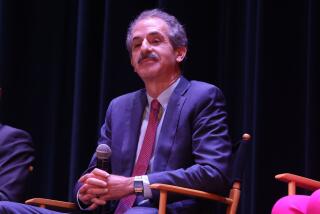Dole Campaign Subpoenaed in Donations Probe
The Senate committee probing campaign finance irregularities agreed on Wednesday to issue subpoenas to Bob Dole’s presidential campaign and a handful of GOP-linked advocacy groups, while the House appeared to be moving toward an inquiry that would allow its investigators to look beyond the Clinton administration, as well.
The Senate made good on its pledge for an expanded bipartisan inquiry by seeking documents from five conservative tax-exempt groups, as well as the Dole and Clinton presidential campaigns and both the Republican and Democratic national committees.
The House will decide today whether it will follow a similar bipartisan route. Following a closed-door meeting Wednesday, House Republicans appear to have settled on a strategy that would allow the chamber’s Government Reform and Oversight Committee to look into anything that comes under its broad jurisdiction--but not specifically call for an inquiry that includes GOP political activities.
Meanwhile, the rancor that already has been sparked by the campaign finance issue boiled over in the House as two lawmakers engaged in a heated shoving incident. The combatants were House Majority Whip Tom DeLay (R-Texas) and Rep. David R. Obey (D-Wis.), who squared off over a 1995 newspaper story alleging that corporate lobbyists gathered in DeLay’s office to help write legislation.
DeLay angrily denied the report. When Obey walked across the House chamber to confront him with the article, DeLay shoved Obey and directed a profanity at him.
Also, House committee investigators honed in on some of President Clinton’s top aides, including Chief of Staff Erskine Bowles and former advisor George Stephanopoulos.
Bowles and Stephanopoulos are among a number of past and present White House officials to receive subpoenas in the House inquiry into foreign-linked donations. In the latest wrinkle, the House is also looking into why administration officials attempted to find work for former Justice Department aide Webster L. Hubbell while he faced a criminal investigation in 1994.
The Senate’s decision to broaden its investigation beyond alleged misdeeds by the White House and the Democratic Party was decided earlier in the year. But until Wednesday, all but two of the 63 subpoenas issued by the Senate Governmental Affairs Committee had focused on Democratic fund-raising.
Of the 10 subpoenas approved Wednesday by Sens. Fred Thompson (R-Tenn.) and John Glenn (D-Ohio), seven of them target GOP-linked organizations, including Americans for Tax Reform, the Coalition for Our Children’s Future and the National Policy Forum.
The Democrats are seeking to show that the organizations are really offshoots of the GOP and engaged in improper campaign activity that would violate their tax-exempt status.
For instance, Democrats say that the Republican National Committee gave $4.6 million in the final weeks of the 1996 presidential campaign to Americans for Tax Reform to aid the GOP election effort. Grover Norquist, the group’s president, denied any wrongdoing and accused the Democrats of trying to divert attention from the acts of Clinton and his aides.
“What we did was all perfectly within the bounds of what is acceptable,” Norquist said. “I’m looking forward to testifying.”
Senate Republicans will look at the same issue on the Democratic side by reviewing Democratic National Committee records involving labor unions and a get-out-the-vote group named Vote Now ’96.
Republicans blocked subpoenas for two well-known, politically influential groups, the Christian Coalition and the Right to Life Committee. Still, the bipartisan approach in the Senate was hailed by Democrats.
“The level of trust among the members of the committee is growing and my optimism that we will be able to conduct a fair and comprehensive investigation is growing,” Sen. Joseph I. Lieberman (D-Conn.) told reporters.
The White House, for its part, made clear that it is finding cooperation much easier with the Senate than the House.
White House spokesman Mike McCurry said that the numerous subpoenas the House committee has directed at past and present administration officials creates a “less-amicable” relationship. By contrast, the administration has struck an agreement with the Senate in which the White House will attempt to produce documents and make employees available for interviews without the need for subpoenas.
“I have not heard any suggestion that there are any subpoenas coming our way from the Senate and, given the amicable conversations that legal counsel has had with the staff, we would hope to pursue the matter in that spirit,” McCurry said.
In the House, the GOP’s insistence on limiting the chamber’s fund-raising inquiry to activities by the Clinton administration long has been a key sticking point between the two parties. Despite the indications that the Republicans might be softening that stance, it remained unclear how Democrats would respond to the GOP’s new position, details of which still were being drafted Wednesday night.
Rep. Dan Burton (R-Ind.), who heads the investigative committee and has been the main proponent of limiting its scope, has scheduled a panel meeting for today to take up the matter.
Wednesday’s physical confrontation between DeLay and Obey occurred during a House debate on whether to schedule a vote on campaign finance reform legislation. Accusing the GOP of blocking campaign reform to protect the status quo, Rep. George Miller (D-Martinez) claimed that Republicans were letting wealthy contributors and business interests have undue influence on legislation.
He and Obey cited a Washington Post story from two years ago that described corporate lobbyists huddling in DeLay’s office to help write a bill imposing a moratorium on new government regulations.
That set the stage for Obey’s angry confrontation with DeLay.
Times staff writer Elizabeth Shogren contributed to this story.
More to Read
Get the L.A. Times Politics newsletter
Deeply reported insights into legislation, politics and policy from Sacramento, Washington and beyond. In your inbox three times per week.
You may occasionally receive promotional content from the Los Angeles Times.







